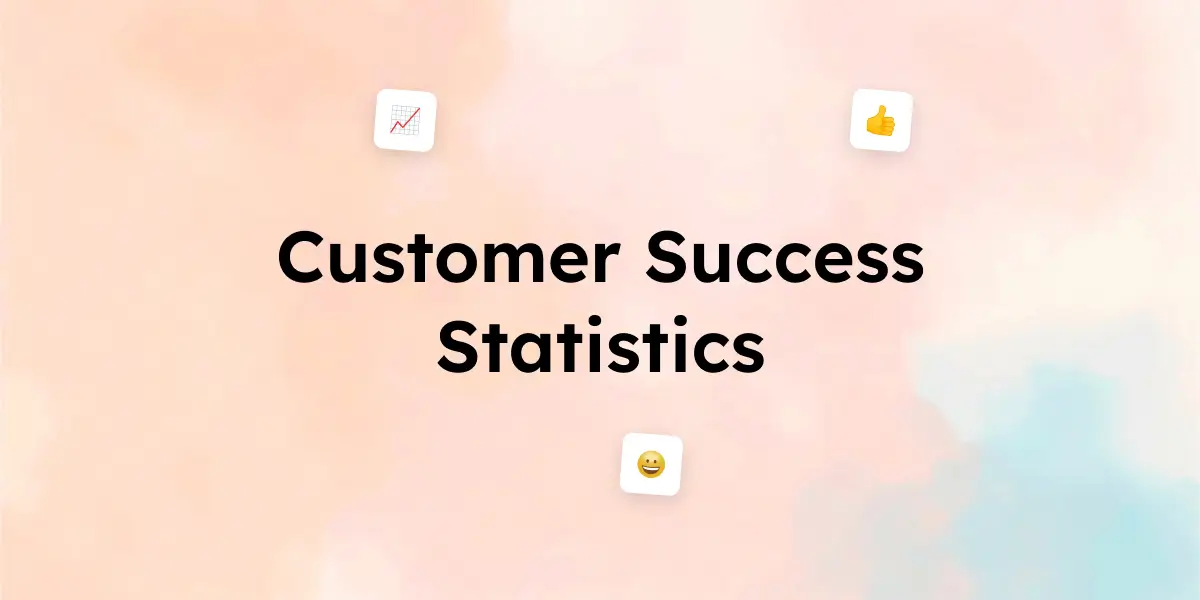Customer success has evolved into a key business strategy rather than just a support function. In 2025, companies that invest in customer retention, AI-driven automation, and personalized experiences will outperform competitors. Businesses that prioritize customer success not only see higher retention rates but also benefit from increased revenue, better brand loyalty, and reduced churn.
In this article, we’ve gathered 40+ up-to-date customer success statistics to help you understand the latest trends, their impact, and how businesses can leverage data to build long-term customer relationships.
40+ Customer Success Statistics
1. The Importance of Customer Success
- 86% of buyers are willing to pay more for a great customer experience.
- 96% of customers say customer service is crucial for brand loyalty.
- Companies that prioritize customer success see a 34% increase in retention rates.
- 72% of businesses say customer success directly impacts revenue growth.
- 80% of companies believe a good customer success strategy leads to long-term business sustainability.
2. Customer Retention & Churn Stats
- A 5% increase in customer retention can boost profits by 25%-95%.
- The average customer retention rate across industries is 72%.
- 68% of customers leave due to perceived indifference, not poor service.
- 89% of customers have switched brands after a poor customer experience.
- The SaaS industry faces an average annual churn rate of 30%.
- 55% of churn is preventable with better customer engagement.
3. Impact of Customer Success on Revenue
- 89% of companies see customer success as a key revenue driver.
- Companies with dedicated CS teams experience 3-5x faster revenue growth.
- 75% of SaaS companies say expanding existing accounts is more cost-effective than acquiring new ones.
- 60% of customers will buy more if they have a great customer experience.
- Companies with high retention rates generate 3.4x more revenue.
- Increasing customer retention by 10% can boost company valuation by 30%.
4. Customer Success & Personalization Trends
- 80% of consumers prefer brands that personalize experiences.
- Personalized onboarding increases retention rates by 50%.
- 90% of businesses say data-driven personalization enhances customer satisfaction.
- 78% of customers expect brands to use their data to enhance their experience.
- Companies using AI-powered personalization see a 25% increase in customer retention.
5. Customer Support & Satisfaction Metrics
- The average Net Promoter Score (NPS) across industries is 30.
- Companies with a high Customer Satisfaction Score (CSAT) (80%+) retain 2x more customers.
- 50% of consumers switch brands after just one bad experience.
- 67% of customers prefer self-service support options over contacting an agent.
- 77% of customers are more loyal to brands that offer proactive customer service.
- The top-performing customer service teams resolve 70% of issues in the first interaction.
6. The Role of Automation & AI in Customer Success
- 73% of customers expect companies to understand their needs using AI.
- Chatbots can resolve 69% of queries without human intervention.
- 58% of businesses plan to invest more in AI-driven customer support.
- AI-powered customer interactions are predicted to grow by 65% in 2025.
- 60% of customer interactions will be handled by AI and automation by the end of 2025.
7. Customer Success & Employee Collaboration
- 88% of high-performing CS teams have strong collaboration with sales teams.
- Companies with engaged employees see a 21% boost in profitability.
- 70% of customer success leaders say their team’s influence has grown in the last 3 years.
- 85% of customer success teams say cross-departmental collaboration improves retention.
8. Future Trends in Customer Success
- 90% of businesses will increase investment in customer success programs by 2025.
- 65% of businesses plan to implement predictive analytics for customer success.
- 80% of businesses will prioritize proactive support rather than reactive solutions.
- The demand for customer success managers (CSMs) is expected to grow by 25% in the next three years.
- 92% of executives believe customer success will be a competitive differentiator in 2025.
Conclusion
The future of customer success is proactive, AI-powered, and highly personalized. Companies that focus on delivering seamless experiences, reducing churn, and leveraging automation will see higher revenue growth.
Key takeaways from the 2025 customer success statistics:
✅ Retention over acquisition – Keeping customers is 5x cheaper than acquiring new ones.
✅ AI & automation – Businesses using AI-driven support are seeing higher efficiency and satisfaction.
✅ Personalization is key – 80% of customers prefer brands that tailor experiences.
To stay ahead in 2025, businesses must prioritize customer success as a growth strategy rather than a reactive support function.
Frequently Asked Questions (FAQs)
1. Why is customer success important for businesses in 2025?
Customer success helps businesses retain customers, increase revenue, and reduce churn. In 2025, customer expectations are higher, and companies that invest in personalized experiences and proactive support will outperform competitors.
2. How does customer success impact revenue?
Studies show that a 5% increase in retention can boost profits by 25%-95%. Customer success ensures higher retention rates, leading to more upsells, cross-sells, and long-term customer relationships.
3. What role does AI play in customer success?
AI and automation are revolutionizing customer success by predicting churn, personalizing interactions, and automating customer support. By 2025, 60% of customer interactions will be AI-driven.
4. What is the difference between customer support and customer success?
Customer support is reactive (resolving issues), while customer success is proactive (ensuring customers achieve their goals). Successful companies invest in both.
5. How can businesses improve their customer success strategy?
To improve customer success, businesses should:
✔️ Focus on personalized onboarding
✔️ Implement AI-driven customer support
✔️ Monitor key metrics like NPS, CSAT, and retention rates
✔️ Align customer success with sales and marketing teams
📚 Sources & References :
PwC
Gartner
Hubspot
McKinsey & Company
Salesforce
Harvard Business Review



